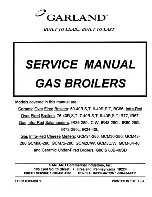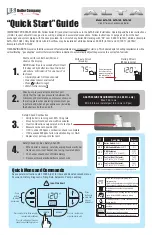
Page
26
of
34
Inspection:
Before installing, inspect the pump shaft by removing the large silver screw to expose
the top of the shaft and turn back and forth with a screw driver to make sure the shaft was not
broken during shipping.
Broken shafts are not covered under warranty unless found and noted
before installation and startup.
Startup:
Make sure the lines are filled and prime the pump by cracking the upper pump flange to
bleed the air out of the impeller and volute.
IMPORTANT: The large, silver bleeder screw must
also be removed from the pump before running for the first time to bleed all air from the
bearings or the pump warranty will be void.
After priming the pump, remove and leave the
bleeder screw out, start the pump to finish bleeding all air out of the bearings, shut off the pump and
re-install bleeder screw. The pump may now run. Always run at high speed for the best efficiency of
the boiler and heat exchangers in the home.
Inspection & Maintenance:
Loosen the bleeder screw once a week (less often as experience
shows otherwise) to flush the bearings to maximize pump life, especially for system filled with poor
quality water (high iron, hardness, total dissolved solids, etc). It is highly recommended that a
customer have their own test kit to monitor treatment levels once a month and add if needed. If
when getting a sample for a test if the water is not perfectly clear, the boiler needs to be shutdown,
drained, flushed, re-filled & treated. Customers must still have a test done by their dealer or
Nature’s Comfort per the warranty with full details on our website (check annually):
http://www.naturescomfortllc.com/boiler-warranty/
To inspect the upper bearing and shaft, unplug the pump, close the valves on either side of the
pump to isolate (one should always be field installed right before the return line enters the water
jacket to be able to fully isolate the pump, lines and HX’s) and remove the bleeder screw to look at
the upper bearing to make sure it’s not worn out causing the rotor to scrub on one side of the
canister housing.
To inspect and clean the rotor and canister, take the 4 Allen screws off to remove the motor from
the volute.
***NOTE: The rotor shaft is ceramic. If it or the pump is dropped, hit, bounced or
jarred it can fracture and/or break. Use care when handling.***
Gently use a screwdriver to pop
the lower SS plate (also serves as the lower bearing) from the canister to pull the rotor out of the
canister. Use a wire brush to clean off any scale buildup from the rotor. To remove the canister first
remove the rotor, then tap on the bleeder screw to remove the canister from the motor (use this
procedure for replacing the entire cartridge as well). White vinegar or a calcium and lime cleaner
can assist for stubborn buildup.
Do not allow any liquids to enter the motor.
Squealing:
Comes from the bearings not having the air bled before running or not having enough
clearance caused by scale buildup around the bearings or around the rotor inside the canister
causing oscillation (vibration). Scale buildup happens if the water has too much hardness and is
something that is greatly accelerated if the water does not have the proper amount of treatment.
Vibration can lead to fracturing and breaking of the shaft and is not covered under warranty.
Scrubbing or ticking noise:
Results from scale build up or the bearings and/or shaft wearing out
allowing the rotor to come in contact with one side of the canister. All eventually lead to “seizing” up.
Not bleeding air from the bearings, improperly treated water and/or high mineral content (hardness
is the biggest problem) and TDS (total dissolved solids) that are abrasive all result in premature
wear of the bearings or scale buildup.
F. End Of Season Care
1. Power:
Turn off power and switches and unplug pumps and control plug.
2. Chimney:
Inspect & Clean. Cap the chimney to keep rain water out, re-seal caulk.
3. Cleaning:
Perform a heavy cleaning and also completely remove all soot and
hardened deposits using a putty knife and wire brush. Completely coat
the steel inside all areas of the boiler with WD40 or a light coat of motor
oil using a brush or rag to protect from rust during the off-season.
Summary of Contents for NCB-120-COAL
Page 2: ......
Page 4: ......
Page 18: ...Page 18 of 34 ...
Page 32: ...NCB Built Like A Tank With Laser Precision Page 32 of 34 ...
Page 34: ...NCB Built Like A Tank With Laser Precision Page 34 of 34 ...









































